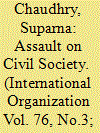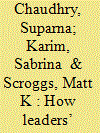|
|
|
Sort Order |
|
|
|
Items / Page
|
|
|
|
|
|
|
| Srl | Item |
| 1 |
ID:
186592


|
|
|
|
|
| Summary/Abstract |
Nongovernmental organizations are central to contemporary global governance, and their numbers and influence have grown dramatically since the middle of the twentieth century. However, in the last three decades more than 130 states have repressed these groups, suggesting that a broad range of states perceive them as costly. When they choose to repress NGOs, under what conditions do states use violent strategies versus administrative means? The choice depends on two main factors: the nature of the threat posed by these groups, and the consequences of cracking down on them. Violent crackdown is useful in the face of immediate domestic threats, such as protests. However, violence may increase the state's criminal liability, reduce its legitimacy, violate human rights treaties, and further intensify mobilization against the regime. Therefore, states are more likely to use administrative crackdown, especially in dealing with long-term threats, such as when NGOs influence electoral politics. I test this theory using an original data set of administrative crackdowns on NGOs, as well as violent crackdown on NGO activists, across all countries from 1990 to 2013. To shed light on the strategic decision between violent or administrative crackdown, and how states may perceive threats from domestic and international NGOs differently, I provide a case study from India. I conclude by discussing the implications of this crackdown for the use of civil society actors by the international community, as well as donors and citizens in the global South.
|
|
|
|
|
|
|
|
|
|
|
|
|
|
|
|
| 2 |
ID:
182662


|
|
|
|
|
| Summary/Abstract |
The use of forced recruitment strategies during war can adversely affect military effectiveness and human rights. Given these costs, under what conditions do state leaders adopt coercive recruitment during civil wars? We find that between 1980 and 2009, states changed their recruitment practices 140 times during civil wars – half of which were towards coercive recruitment. Since structuralist explanations focus on factors that remain more or less constant over time, they cannot explain the frequency of these changes. Instead, we focus on individual-level factors and argue that leaders’ dispositions as risk-takers determine their beliefs about using force to solve collective action dilemmas during civil wars. Further, conflict context matters for leaders’ recruitment decisions – when rebel groups engage in coercive recruitment, leaders may also feel more justified in using such strategies. Using the LEAD Dataset and data on recruitment, we find that risk-tolerant leaders, including those who have had careers in the security sector, as well as those who have prior experience as a rebel or revolutionary leader, are more likely to use force to increase recruitment. While we theorize that this effect may be mitigated by combat experience, the evidence is mixed. Lastly, we find that rebels’ use of forced recruitment makes state leaders less likely to use voluntary recruitment.
|
|
|
|
|
|
|
|
|
|
|
|
|
|
|
|
|
|
|
|
|